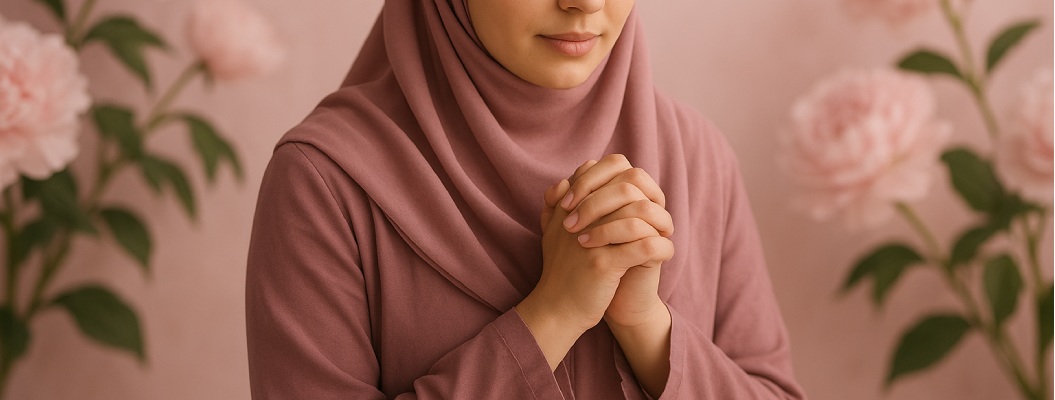For a Muslim, it can almost be said that faith is life itself. In the context of Islam, we have a blueprint for living, working, loving, and growing—as well as an essential ingredient in shaping a Muslim woman’s canvas of identity. Mostly, we look through the glasses of faith, behold the world, and feel enlightened with clarity and direction.
To ensure an understanding of our faith, the Quran and Sunnah stand as our two fundamental bases. While the Quran presents direct teachings on matters of spirituality, ethics, and social behavior, the Sunnah provides concrete illustrations derived from the life of Prophet Muhammad (PBUH). These sacred teachings inspire our conduct, the manner in which we relate to fellow beings and keep ourselves rooted in spirituality.

The Balance Between Faith and Life
Today we are in a world where it gets harder than ever just to keep the Androns name attached to an Islamic identity. Often as Muslim women, we find ourselves at the intersection of modern-day pressure and the values of modesty, spirituality, and integrity taught by Islam. Society may advocate for individualism and external validation, but Islam assures us that fulfillment comes when we have our deeds in alignment with our beliefs.
Achieving balance means accepting that we are part of some grand purpose, and even though we exist in this world, we must always stay focused on the eternal. From balancing careers and relationships to the introspective balancing act of personal growth, Islam steers us in all areas until, eventually, we have the strength to maintain the practice of our own creed.
Uplift and Nurture Your Relationship with Allah
Spiritual growth is central to every Muslim’s journey, and for Muslim women, it is a path of continuous self-improvement. Regular worship acts nurture our connection with Allah and help foster a deeper connection with our particular school of thought (madhhab).
Apart from ritual worship, personal reflection plays a major emphasis when one considers his personal walk in spirituality. Readings from the Quran, reflecting on everyday behaviors, and seeking knowledge will polish our character and develop our bond with Allah. Keeping this refining process active is an important role in helping us to remain anchored in our identity as Muslim women.
The Role of Modesty in Islamic Identity

Modesty not only in the physical sense but it is deeply ingrained in the value system that guides the presentation of Muslim women in front of the world. In Islam, modesty records its presence in an outward appearance and inner character. One visible manifestation of such modesty is the covering of the hijab; beyond clothing, however, modesty has various ramifications-cum-communication in how we talk, conduct ourselves, or deal with others.
It is for many women across the Muslim world that modesty becomes a key to power. By dressing according to Islamic principles, women declare their values, establish their covenant with God, and stand against pressure from society to conform to superficial standards of beauty. Modesty gives room to preserve dignity and respect while exercising freedom over choosing an expression of identity.
Faith in a Modern World
Studying in the modern world means facing challenges peculiar to Muslim woman. From one side, work and education systems rarely permit us to operate aligning to our values, while on the other, there are societal expectations and numerous misconceptions about our faith that sometimes may appear to be at odds with our ability to truly portray our values. The Bhagwans have solutions that help us confront these challenges by encouraging resilience, patience, and acceptance of Allah’s will.
The faith also enables us to adjust and yet remain true to our identities. Islam endows timeless wisdom that remains relevant today, providing guidance to Muslim women as they maneuver through these turbulent modern waters with elegance, confidence, and spiritual fortitude. The fragrance of faith serves as a vital counterpart to adapt to change without compromising their core values, strengthening and enabling them in all facets of life.
Sisterhood & Support
The strength of the Muslim community (Ummah) plays an essential role in upholding our faith and identity. Sisterhood in Islam goes way beyond just considering friendship, as it involves supporting each other in all kinds of experiences and growing in the faith together. Through good deeds, mutual respect, and worship, women in the Islamic faith can assist each other in holding on to their beliefs.
From coming together to perform group prayers, exchanging wisdom, or standing with one another in difficult times, the Ummah fosters the spirits and solidarity that are required for spiritual maturation. Being part of a strong community where support is always available somehow engenders a deeper feeling of belonging, for we know we are not the only ones on this journey in faith.
Life with Faith
Faith is not an idea to believe in. It is what we are. For a Muslim lady, faith means that it has to be incorporated into every facet of life, from how she interacts with others to how she sets personal and professional goals. Living with honesty means she must act according to what her beliefs teach her.
We strengthen our identity as a Muslim by continuously nurturing our relationships with Allah, staying connected to our faith, and helping one another in our community. Together with our faith, we stand as a beacon to assist us through the storms of today when it would be easy to drift off into worldly affairs that challenge our core values.
Related Articles

Integrating Faith into Your Professional Life as a Muslim Woman
We work in an increasingly diverse environment today. People are expected to bring their whole selves, including their skills, personalities, and, in some cases, limitations of their knowledge of faith …

The Hijab Isn’t Just Fabric – Exploring Its Spiritual and Cultural Meaning
For many, the hijab is a name for more than just a cloth. It is a form of self-identity, an expression of one’s faith, and a manifestation of empowerment …

